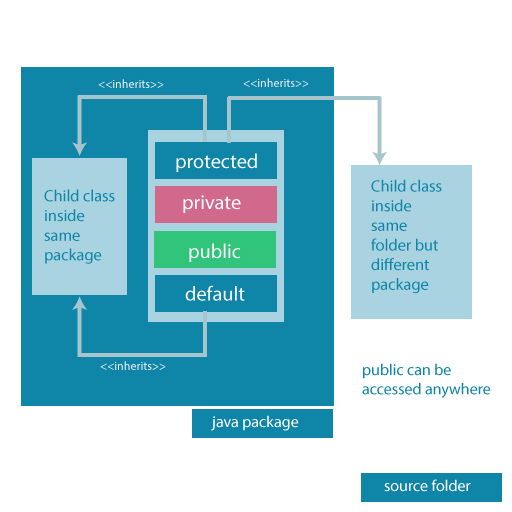
Note the keyword public and private . These are access modifiers in Java. They are also known as visibility modifiers.
Note: You cannot set the access modifier of getters methods.
Before you learn about types of access modifiers, make sure you know about Java Packages.
There are four access modifiers keywords in Java and they are:
| Modifier | Description |
| Default | declarations are visible only within the package (package private) |
| Private | declarations are visible within the class only |
| Protected | declarations are visible within the package or all subclasses |
| Public | declarations are visible everywhere |
If we do not explicitly specify any access modifier for classes, methods, variables, etc, then by default the default access modifier is considered. For example,
package defaultPackage; class Logger < void message()< System.out.println("This is a message"); >>Here, the Logger class has the default access modifier. And the class is visible to all the classes that belong to the defaultPackage package. However, if we try to use the Logger class in another class outside of defaultPackage, we will get a compilation error.
When variables and methods are declared private , they cannot be accessed outside of the class. For example,
class Data < // private variable private String name; >public class Main < public static void main(String[] main)< // create an object of Data Data d = new Data(); // access private variable and field from another class d.name = "Programiz"; >>In the above example, we have declared a private variable named name . When we run the program, we will get the following error:
Main.java:18: error: name has private access in Data d.name = "Programiz"; ^The error is generated because we are trying to access the private variable of the Data class from the Main class.
You might be wondering what if we need to access those private variables. In this case, we can use the getters and setters method. For example,
class Data < private String name; // getter method public String getName() < return this.name; >// setter method public void setName(String name) < this.name= name; >> public class Main < public static void main(String[] main)< Data d = new Data(); // access the private variable using the getter and setter d.setName("Programiz"); System.out.println(d.getName()); >>Output:
The name is Programiz
In the above example, we have a private variable named name . In order to access the variable from the outer class, we have used methods: getName() and setName() . These methods are called getter and setter in Java.
Here, we have used the setter method ( setName() ) to assign value to the variable and the getter method ( getName() ) to access the variable.
We have used this keyword inside the setName() to refer to the variable of the class. To learn more on this keyword, visit Java this Keyword.
Note: We cannot declare classes and interfaces private in Java. However, the nested classes can be declared private. To learn more, visit Java Nested and Inner Class.
When methods and data members are declared protected , we can access them within the same package as well as from subclasses. For example,
class Animal < // protected method protected void display() < System.out.println("I am an animal"); >> class Dog extends Animal < public static void main(String[] args) < // create an object of Dog class Dog dog = new Dog(); // access protected method dog.display(); >>Output:
I am an animal
In the above example, we have a protected method named display() inside the Animal class. The Animal class is inherited by the Dog class. To learn more about inheritance, visit Java Inheritance.
We then created an object dog of the Dog class. Using the object we tried to access the protected method of the parent class.
Since protected methods can be accessed from the child classes, we are able to access the method of Animal class from the Dog class.
Note: We cannot declare classes or interfaces protected in Java.
When methods, variables, classes, and so on are declared public , then we can access them from anywhere. The public access modifier has no scope restriction. For example,
// Animal.java file // public class public class Animal < // public variable public int legCount; // public method public void display() < System.out.println("I am an animal."); System.out.println("I have " + legCount + " legs."); >> // Main.java public class Main < public static void main( String[] args ) < // accessing the public class Animal animal = new Animal(); // accessing the public variable animal.legCount = 4; // accessing the public method animal.display(); >>Output:
I am an animal. I have 4 legs.

Access modifiers are mainly used for encapsulation. It can help us to control what part of a program can access the members of a class. So that misuse of data can be prevented. To learn more about encapsulation, visit Java Encapsulation.